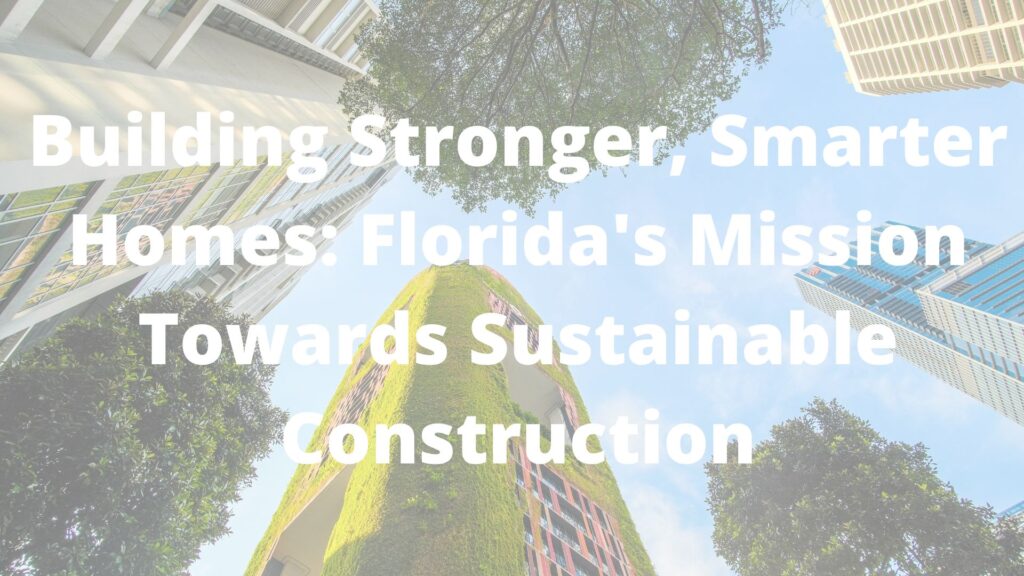
Florida, a state uniquely beautiful but also uniquely vulnerable to the impacts of a changing climate, is at the forefront of a critical mission: to embrace sustainable construction practices.1 This isn’t just about being “green”; it’s about building homes and communities that are resilient, energy-efficient, and designed for long-term well-being, while also mitigating environmental impact.2
We recently highlighted the groundbreaking SAMPL™ (Sustainable Adaptive Material Performance Level) tool developed at the University of Florida, which empowers homeowners to choose flood-resistant materials. This tool is a perfect example of Florida’s broader commitment to a sustainable built environment.
Why Sustainable Construction is Essential in the Sunshine State
Florida faces distinct environmental pressures, from rising sea levels and increased hurricane activity to concerns about water resources.3 These challenges underscore the urgent need for construction methods that not only stand strong against nature’s forces but also reduce our ecological footprint. Sustainable construction in Florida focuses on:
- Resilience: Protecting homes and communities from the impacts of natural disasters like floods and hurricanes is paramount. This involves choosing materials and designs that can withstand extreme weather and recover quickly.
- Energy Efficiency & Renewable Energy: With abundant sunshine, Florida is a prime candidate for solar power.4 Initiatives focus on incorporating solar panels, smart energy technologies, and highly efficient HVAC systems to drastically reduce energy consumption and utility costs.5 Major energy providers, like FPL, are even setting ambitious “Real Zero” goals for decarbonization, emphasizing a cleaner energy future for the state.6
- Water Conservation: Given periods of drought and the importance of preserving precious water resources, sustainable construction promotes strategies like low-flow fixtures, rainwater harvesting systems for irrigation, and the use of native, drought-tolerant landscaping.7
- Eco-Friendly Materials & Healthy Indoor Environments: The mission extends to the very materials used.8 This includes prioritizing recycled, locally sourced, and rapidly renewable materials (like bamboo or reclaimed wood), as well as non-toxic paints and finishes to improve indoor air quality and promote healthier living spaces.9
Leading the Way: Florida’s Sustainable Building Initiatives
Various organizations and initiatives across Florida are driving this sustainable construction mission forward:
- Certification Programs: Industry standards like LEED (Leadership in Energy and Environmental Design), the Florida Green Building Coalition (FGBC) certification, and the ICC 700 National Green Building Standard (NGBS) provide frameworks and benchmarks for green building practices.10 Many projects seek these certifications to demonstrate their commitment to sustainability.11
- Government & Housing Programs: The Florida Department of Environmental Protection (DEP) offers Sustainable Initiatives Programs, and the Florida Housing Finance Corporation’s “Go Green” requirements incentivize green building features in affordable housing.12 Cities like Orlando have also made significant commitments to clean energy and green buildings, implementing policies like building energy and water efficiency strategies.13
- Innovative Communities & Projects: Visionary projects like Babcock Ranch, a solar-powered town in Southwest Florida, demonstrate what’s possible when sustainability is built into the very fabric of a community, integrating energy-efficient homes with vast green spaces and natural habitats.14 Universities, such as the University of Florida (through efforts like SAMPL™ and the Program for Resource Efficient Communities – PREC) and Florida Tech, are also active in research, education, and implementing sustainable building practices on their campuses.15
The Broader Impact: Benefits for All
The shift towards sustainable construction in Florida offers manifold benefits that extend beyond environmental protection:16
- Economic Savings: Lower energy and water bills translate into significant long-term savings for homeowners.17
- Increased Property Value: Sustainable homes are increasingly attractive to eco-conscious buyers, potentially increasing property value and marketability.18
- Enhanced Quality of Life: Healthier indoor environments, greater comfort, and connection to nature contribute to a better quality of life for residents.19
- Community Resilience: Building stronger, more adaptable homes helps communities withstand and recover from adverse events, fostering greater stability and security.
Florida’s sustainable construction mission is a dynamic and evolving effort, driven by a recognition of the state’s unique vulnerabilities and a shared vision for a more resilient, prosperous, and environmentally responsible future.
Sources:
- New tool helps homeowners choose materials for resilient design
- Florida Concrete & Products Association – Sustainability initiatives (fcpa.org)
- Sustainable Construction Group – Mission and practices (sustainableconstructiongroup.com)20
- Florida Green Building Coalition – Background and mission (floridagreenbuilding.org)21
- Florida Department of Environmental Protection – Sustainable Initiatives Programs (floridadep.gov/osi)
- Best Practices for Sustainable Construction in Florida – FBMA (fbma.org)
- Sustainable Florida, a Green State – FPL Economic Development (com/why-florida/sustainability.html)
- Building A Sustainable Town in Florida – Babcock Ranch (com/building-a-sustainable-town-in-florida/)
- Sustainable Communities – Solutions for Your Life – University of Florida, IFAS (sfyl.ifas.ufl.edu/sustainable-communities/)22
- Go Green – Florida Housing Finance Corporation (floridahousing.org/programs/special-programs/go-green)
- Sustainable Building Practices: Going Green in the Sunshine State – Licenses Etc. (licensesetc.com)
- Clean Energy and Green Buildings – City of Orlando (orlando.gov/Our-Government/Departments-Offices/Executive-Offices/CAO/Sustainability-Resilience/Green-Works-Focus-Areas/Clean-Energy-and-Green-Buildings)23
- Sustainable Building Practices | Florida Tech (fit.edu/mechanical-and-civil-engineering/construction-management/areas-of-study/sustainable-building-practices/)24
 John Caravella Esq., is a construction attorney and formerly practicing project architect at The Law Office of John Caravella, P.C., representing architects, engineers, contractors, subcontractors, and owners in all phases of contract preparation, litigation, and arbitration across New York and Florida. He also serves as an arbitrator to the American Arbitration Association Construction Industry Panel. Mr. Caravella can be reached by email: [email protected] or (631) 608-1346.
John Caravella Esq., is a construction attorney and formerly practicing project architect at The Law Office of John Caravella, P.C., representing architects, engineers, contractors, subcontractors, and owners in all phases of contract preparation, litigation, and arbitration across New York and Florida. He also serves as an arbitrator to the American Arbitration Association Construction Industry Panel. Mr. Caravella can be reached by email: [email protected] or (631) 608-1346.
The information provided on this website does not, and is not intended to, constitute legal advice; instead, all information, content, and materials available on this site are for general informational purposes only. Readers of this website should contact their attorney to obtain advice with respect to any particular legal matter. No reader, user, or browser of this site should act or refrain from acting on the basis of information on this site without first seeking legal advice from counsel in the relevant jurisdiction. Only your individual attorney can provide assurances that the information contained herein – and your interpretation of it – is applicable or appropriate to your particular situation. Use of, and access to, this website or any of the links or resources contained within the site do not create an attorney-client relationship between the reader, user, or browser and website authors, contributors, contributing law firms, or committee members and their respective employers.
